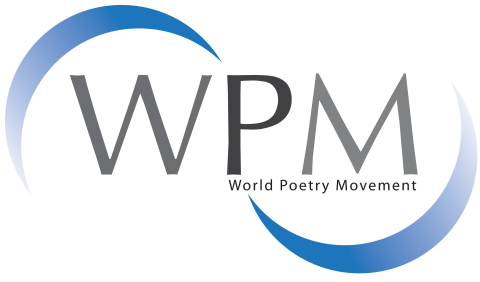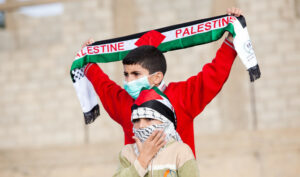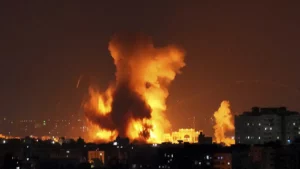Report from Europe to the 1st WPM Congress
By Francis Combes
Poetry is the oldest word of humanity, but it can also be the word endowed with the strongest power for the future. It typically comes out of the cave and always reaches for the stars. It is the word that carries that part of darkness which is always within us, our errors, our fears, our fascination for what is strange, at the same time as our knowledge, our hope, our unfailing need for clarity, of elucidation, of understanding, of our sense of joy, harmony and happiness. Poetry is the very movement of humanity.
Through its images, it connects us with analogical thought, the pre-logical thought of the first humans, when we were immersed in nature, when we were one with it, when it dominated us and spoke to us in everything, in every stone, in every tree, in every animal.
Without denying the usefulness of technique and logic, poetry is this complementary and indispensable approach which, instead of dividing the world to dominate it, makes it possible to feel its unity, to live connected to nature, to the world, to cosmos.
Word with images, poetry is also – at all times and in all places – a rhythmic word. And this rhythm (which responds to the fundamental pulsation of life, to the beating of the heart), is what connects us to others, what allows the individual to join the collective and bring their own musical score to it.
Finally, poetry also has a third virtue, which is particularly important today. It is not only the heir of ancient symbolic and magical thought, but it is also the language of this fundamental human faculty which is imagination. Human beings belong to a fabulous species. We invent stories that help us live and, in doing so, we invent our own story.
It is sometimes said that poets are made no differently than others. It’s true. But we know that those who are generally By acting “as if,” a child recreates the world and inhabits it. And that is the work of the poets whom the English poet Shelley said were the “unacknowledged legislators of the world.” Through the play of the poem, we rearrange the elements of the world to make it more beautiful, we reorganize it according to the order of our desire. We exercise our faculty of imagination, which is the very essence of human freedom. We can anticipate the future.
Poetry is the word that leaps over frontiers. It is that sense of the world that we so urgently need today. It is both the language of our agreement with the world but also that of our disagreement with its present state and the expression of our aspiration for another world.
*
* *
During our virtual European congress which brought together poets from around forty countries, we were not satisfied with formal exchanges but we had a real discussion.
Despite the diversity of points of view and sometimes real disagreements between us on current issues, we are deeply united. We share a common passion for poetry and a sense that it has an essential role to play in moving, as our conference theme says, “from death to life.”
Even if our action obviously has a political dimension, for us, the World Movement of Poets is not a political party. And let alone a political party built on an old centralized model.
We would rather define the World Movement of Poets as a sort of International of Poets for today, to which everyone may contribute, with their personality, their uniqueness, while being attentive to others and ready to enrich themselves through their contact. Respect for the freedom of each of the national groups and of each of the poets within these groups is vital, not only to preserve our unity but also to guarantee the possibilities of enlargement of the WPM. Too many poets today are unaware of our existence or, sometimes if they know of our existence, prefer to stay away for fear of being recruited.
Our purpose is to promote and share as widely as we can, in society and among young people, from childhood, the taste for poetry. We can show and feel “that another world exists but it is in this one,” as the French poet Paul Eluard said in the days of the Resistance against Nazism. A world that would not be based on competition, greed, violence and hatred, but on peace and cooperation, friendship, love of life, sharing beauty.
In the world we live in, it is not easy to establish “five-year plans” without risking being contradicted by life because we do not know what tomorrow will bring. (In January 2022, for example, we did not foresee the imminent outbreak of war in Europe). But we can set ourselves lines of work, to strive to achieve them by having them evolve if necessary. Allow me to summarize those that we adopted at the end of our European congress:
1- Above all, we will endeavor to multiply and strengthen the links between poets from all over Europe. And beyond, with the poets of the world. We want to bring to life the spirit of true poetic internationalism. At a time when many are erecting the barriers of nationalist withdrawal, xenophobia, authoritarianism, censorship, fascism and war, we are multiplying the bridges, perhaps fragile but precious, between us. We thus intend to continue and develop our activity of exchange and translation of poems; we want to present in our multiple linguistic worlds a diversity of world poetry. “Translation is the language of Europe,” Umberto Eco once said. We will strive to translate and distribute quality poems as widely as possible, to say them in readings, at poetry festivals, to publish them on our Facebook pages, on social networks, to print them in books, with collections dedicated to the WPM, (as we have started to do in several countries)…
2 – Our second objective is to develop a great movement of poets for peace. Let’s be clear: if the WPM misses this task, it will have failed in its historical duty. At a time when everywhere in the world, and particularly in Europe, the voice is in arms, gun dealers and warmongering propaganda, we have a duty to make the voices of poets heard in favor of peace. Not just to save “the honor of poets,” but also to contribute to a change in public opinion. All peoples yearn for peace, everywhere. But for the moment the voice of the peoples is hardly heard… The floor is for those who use war to try to safeguard their hegemony over different regions of the world, to establish or re-establish their control over land, gas, oil, the wealth of the various continents. The open confrontation between the great powers which all possess nuclear weapons is fraught with danger. It can lead – if it has not already started – to a Third World War. However, war, whether local or general, is not the solution. At one point or another, we will have to sit down and talk. The only real solution is through respect for international rules and respect for the right of peoples to self-determination. The freedom and sovereignty of peoples today is violated, but it is vital. It is even the condition of peace.
And everywhere on earth we are confronted with the double necessity of national sovereignty and cooperation between peoples, without which we will not solve our problems.
Rather than sinking billions into the massacre of the youth of Ukraine and Russia, and into the aggravation of the suffering of the civilian population, it would be urgent to silence the guns and give way to diplomacy, to respect for international rules. The time is not to self-destruct but to work together, peacefully, to solve the vital problems of the planet: global warming, the defense of life on Earth, the injustices and inequalities that disfigure and bruise humanity, mostly inequalities between men and women
A year ago now, (after the conflict in Donbas, which had been endemic for several years, degenerated) following the invasion of Ukraine by the Russian army, war settled in the heart of Europe . And we are now witnessing a dangerous escalation for world peace, with an ever-increasing involvement of NATO.
As soon as this war broke out, in March 2022, we launched the idea of a World Poetry Channel for Peace. The objective was both to make the voice of the poets express itself but also to maintain contact with the poets of the belligerent countries. At the beginning there was reluctance that we can understand, but, finally, it is more than 200 poets, Russians, Ukrainians, poets from different countries of Europe, Asia, Africa, America, and Oceania who took part.
The question that is posed to us collectively today, at the level of the WPM, would be to give a much greater extension to this action and to ensure global public visibility.
In this spirit, we plan to hold a European Congress of Writers and Poets for Peace next year in Paris.
3 – Much has been said at continental congresses, particularly in Africa and Latin America, about the place of poetry in schools and the need to promote its teaching. We even launched the idea of a School of Poetry and this idea began to materialize. Which obviously interests us.
At our congress, we emphasized this need: “In our effort to promote poetry and mutual understanding, we must attach particular importance to working with children. We must work to reveal the poet who sleeps in everyone”.
There can obviously be no question of teaching a univocal vision of poetry. Poetry is plural, and it never stops evolving. Every poet spends his life trying to define it. But it is because we have a lot to learn that we can try to teach, and share our passion.
4 – As Ataol Behramoglu said during our congress: “One of the main problems with poetry today is its disconnection from everyday life”. We can spread poetry in the public space, bring poetry back to the streets. Including through posters. We can take up the experience launched in France, as proposed by Alexis Bernaut, of a poetic campaign on the theme: “We are the people of the world” with poems from the four corners of the Globe… In all our countries, the inhabitants of our cities come from here and elsewhere, they form a multicolored mosaic, and this people-world in formation, (which matches the visionary idea of the “planetariat” coined by our friend Jack Hirschman) is virtually the one who holds the fate of the planet is in their hands. So, let’s publish the poems of the People-world!
This is also how we can contribute to the emergence of a new planetary poetic consciousness.
5 – Finally, we intend to act more strongly in defense of freedom. If poetry is the free form of language, it is also the language of freedom. Poets cannot bear despotisms of all kinds which today oppress so many men, and particularly women, almost everywhere on the planet. In many countries, autocratism, theocratism stifle the universal aspiration to freedom. And in European countries, which are rightly proud of their tradition of individual freedoms, we know how the empire of money imposes its insidious censorship and tends to silence all voices, and particularly all critical poetry, by drowning it in the flood of insignificance and commodity.
We propose that the WPM make action for freedom of expression one of its main objectives.
For our part, we have already intervened to support several imprisoned poets, regardless of the country where these events occur. We cannot remain locked into a geopolitical logic, of camps which would prohibit us from defending freedom everywhere, even in countries for which we can, one or the other, feel sympathy, because of their history or their present situation. We are not diplomats… we are not on the side of States, but on the side of poets.
After the Palestinian poet Ashraf Fayad for whom we have successfully mobilized, I would like to cite the case of the Kurdish poet Ilhan Sami Comak, imprisoned for twenty-eight years in Turkey, to whom we have begun to address letters-poems of solidarity. The case of the young Russian anarchist poet Artem Kamardin, arrested for having provocatively protested against the war. Or the Iranian poet Atefeh Chaharmalian, thrown into a cell after the women’s demonstrations in Tehran.
Finally, we decided following the proposal of Luis Filipe Sarmento, to hold next October in Portugal, a European meeting of which one of the major themes could be “Poetry, freedom of speech.”
Our organization
Last point: the internal organization of the WPM. We are in favor of the idea of a collegial management, in which each continent would be represented. The life of WPM cannot rest on the shoulders of one man, no matter how active. While maintaining the spontaneity of our internal way of life, we need to structure our organization to give us the means for our action. This applies globally but also nationally or continentally.
Wherever we can, we should form officially constituted associations, with members, statutes, offices, treasurers. This should allow us to apply for aid and subsidies and would ensure democratic functioning.
I wish success to our first World Congress!




